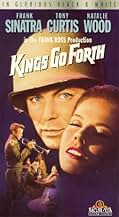Añade un argumento en tu idiomaToward the end of World War II, two American soldiers fighting in Southern France become romantically involved with a young, American woman. Her background will reveal more about them than h... Leer todoToward the end of World War II, two American soldiers fighting in Southern France become romantically involved with a young, American woman. Her background will reveal more about them than her.Toward the end of World War II, two American soldiers fighting in Southern France become romantically involved with a young, American woman. Her background will reveal more about them than her.
- Dirección
- Guión
- Reparto principal
- Cpl. Lindsay
- (as Edward Ryder)
- Jazz Musician: Trumpet
- (sin acreditar)
- Blairs' Butler
- (sin acreditar)
- Old Frenchwoman with Wine
- (sin acreditar)
- Jazz Musician: Tenor Sax
- (sin acreditar)
- Jazz Musician: Drums
- (sin acreditar)
- Jazz Musician: Vibraphone
- (sin acreditar)
- Captain Harrison
- (sin acreditar)
- Jazz Musician: Guitar
- (sin acreditar)
- Jazz Musician: Bass
- (sin acreditar)
Reseñas destacadas
I shouldn't have loved this movie as much as I did. But it touches on those basics of love and life and rivalry and goodness I couldn't help be manipulated. And it's set in Villefranche, one of my favorite places in the world, and it's set during WWII, when life for Europe was its most on fire. And there I was, crying and loving it.
"Kings Go Forth" is actually a slightly late in the game WWII flick that shifts attention at first to luxuriating soldiers in the south of France just as the war was ending. It's not as much about war (though there are some remnants of fightings which are tense). It's more about a bunch of decent guys, two of them in particular, and their misunderstandings. And it's about love. The south of France and the Mediterranean is about as decent a setting for romance as you get. It's idealizing (everyone loves the Americans in their Jeeps, which must be half true, but not entirely), and it's all sunny weather and champagne. Except that love is never easy, and it gets more and more intense, sad, and profound. Yes, profound.
Tony Curtis is terrific as usual. As Brit Harris he is charming, funny, and clever. Natalie Wood in one of many great roles between "Rebel Without a Cause" and "West Side Story" is rather perfect, except maybe her French accent. But she represents, as Monique Blair, something perfectly innocent and yet ravaged by war. The other lead, the main character Sam Loggins, is played by Frank Sinatra, and Loggins also loves Blair. At first Loggins is noble and lets Harris win the girl's heart, but then it gets complicated.
There is a fabulous last war scene for the climax, featuring a special mission needing just two men--our leads, now enemies and distrustful. But in the heat of their battle, Harris gives some real wisdom about character, and Loggins shows true compassion. It's war, the worst and the best of it. And it's the worst and best of love, too, with an ending just slightly hanging in mid-air.
Director Delmer Daves pulls off a lot of great, nicely felt films. They often lack an edge of innovation or of real probing triumph, but this is one of those that brings a lot of issues, including racism at its simplest, to a believable story. Don't brush this movie off. And don't be put off by the first twenty minutes or so when the establishing scenes seem like just another good war film. This one goes places, at least for the romantic.
Pleasing and enjoyable story about love , race and war with a great trio : Sinatra , Wood and Curtis
This wartime movie picture is an enjoyable tale with an interesting characterizing about a few characters , tragic drama and evocative outdoors from French Riviera , including some war scenes . The film utilizes an oft-used storyline of the war movie genre which has two soldiers in love with the same girl . This stirring as well as intimate story is a passionate retelling and a touching triangular drama . The storyline relies heavily on the continued relationship among them ; in spite of , the movie results to be better than average , being surprisingly good and compellingly realized . Based on a novel by Joe David Brown with thought-provoking screenplay by Merle Miller . Nice acting by trio protagonist , all of them give fine performance along with a fine support cast such as Karl Swenson and special mention of Leora Dana as mummy Blair . Thrilling as well as moving Original Music by the maestro Elmer Bernstein . Atmospheric and adequate Cinematography by Daniel L. Fapp .
The motion picture was professionally directed by Delmer Daves , though not particularly satisfying on either race front or the war . Daves was a good professional , he began as a technical adviser on films with a college background . Soon afterward he entered films as an actor, and after appearing in several pictures he began collaborating on screenplays and original stories. He wrote scripts for many of Hollywood's best films of the 1930s and 1940s, including The Petrified Forest (1936) and Love affair (1939) . Turning director with the classic Destination : Tokio (1943), Daves often wrote and produced his own pictures. Of the many films he made, the westerns he did were especially close to his heart ; as a youth he had spent much time living on reservations with Hopi and Navajo Indians . As he was a Western expert such as proved in ¨The hanging tree¨ , ¨3:10 to Yuma¨, ¨The last wagon¨, Jubal , ¨Drum beat¨, ¨Return of the Texan¨, ¨Cowboy¨ and the notorious ¨Broken arrow¨ .
Tony Curtis’ part as the smooth-talking but put-upon charmer is effectively an extension of his Sidney Falco in Alexander Mackendrick’s SWEET SMELL OF SUCCESS (1957). The female roles are equally well filled: a lovely 19-year old Natalie Wood plays a young mulatto American raised in France who comes between Army “buddies” Sinatra and Curtis, while 35-year old Leora Dana is cast as Wood’s proud middle-aged mother (she must have quite impressed Sinatra because she was in SOME CAME RUNNING too – as Arthur Kennedy’s wife).
The film – backed by a fine score from Elmer Bernstein and including a jam session featuring Curtis and real-life jazz musicians – is well enough made scene by scene and certainly well acted, but the effect is slightly diluted by the unnecessary and ultra-soapy coda (Sinatra losing an arm, Dana dying, Wood gathering together and teaching war orphans – but especially the corny children’ song at the very end). The film is much more of a romantic melodrama than it is a war movie, but the few action sequences therein are good and well spread out throughout the film.
Delmer Daves may have been best renowned for his Westerns – but his very first shot as a director had actually come via a war movie, DESTINATION TOKYO (1943), and he eventually returned to the same territory intermittently with PRIDE OF THE MARINES (1945), TASK FORCE (1949) and, finally, KINGS GO FORTH itself.
¿Sabías que...?
- CuriosidadesThe role of Monique was originally written with Dorothy Dandridge in mind.
- PifiasCameraderie between Sam (an officer) and Britt (an enlisted NCO whose rank goes up and down as the story unfolds), is unmilitary and unreal, particularly their calling each other by their first names.
- Citas
1st Lt. Sam Loggins: How do you feel about riding in a jeep?
Mrs. Blair: It's one of the several experiences I promised myself before I die. Another is jumping out of a parachute.
1st Lt. Sam Loggins: No, dear. You jump out of a plane. You hold onto the parachute.
- ConexionesReferenced in In Person (1993)
Selecciones populares
- How long is Kings Go Forth?Con tecnología de Alexa
Detalles
- Fecha de lanzamiento
- País de origen
- Idiomas
- Títulos en diferentes países
- Kings Go Forth
- Localizaciones del rodaje
- Empresas productoras
- Ver más compañías en los créditos en IMDbPro
- Duración
- 1h 49min(109 min)
- Color
- Relación de aspecto
- 1.85 : 1
































